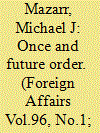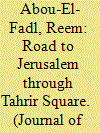| Srl | Item |
| 1 |
ID:
149629


|
|
|
|
|
| Summary/Abstract |
Few foreign policy issues have attracted more attention in recent years than the problem of sustaining the U.S.-led liberal international order. After World War II [1], the United States sponsored a set of institutions, rules, and norms designed to avoid repeating the mistakes of the 1930s and promote peace, prosperity, and democracy. The resulting system has served as the bedrock of U.S. national security strategy ever since. In everything from arms control to peacekeeping [2] to trade [3] to human rights, marrying U.S. power and international norms and institutions has achieved significant results. Washington continues to put maintaining the international order at the center of the United States’ global role.
|
|
|
|
|
|
|
|
|
|
|
|
|
|
|
|
| 2 |
ID:
111230


|
|
|
|
|
| Publication |
2012.
|
| Summary/Abstract |
This article addresses an aspect of Egypt's 2011 revolution almost entirely ignored in most Western media accounts: Israel and Palestine as prominent themes of protest. In reviewing Egyptian mobilization opposing normalization and in support of the Palestinian cause starting from Sadat's peace initiative of the mid-1970s, the author shows how the anti-Mubarak movement that took off as of the mid-2000s built on the Palestine activism and networks already in place. While the trigger of the revolution and the focus of its first eighteen days was domestic change, the article shows how domestic and foreign policy issues (especially Israel and Palestine) were inextricably intertwined, with the leadership bodies of the revolution involved in both.
|
|
|
|
|
|
|
|
|
|
|
|
|
|
|
|
| 3 |
ID:
149363


|
|
|
|
|
| Summary/Abstract |
Do non-graded, one-time, short presentations by a panel of professors on foreign policy issues affect voting behavior among students? Did the panel itself contribute to students’ understanding of the importance of foreign policy in evaluating candidates? Did presentations lead to changes in students’ candidate preferences? And, finally, did the event lead to sustained changes in students’ preferences? We find that even though issues of foreign policy tend not to be front and center in American elections, when young voters are presented with information about candidate’s foreign policy positions, as we did in this study, it does seem to have an impact on which candidate they plan on voting for.
|
|
|
|
|
|
|
|
|
|
|
|
|
|
|
|